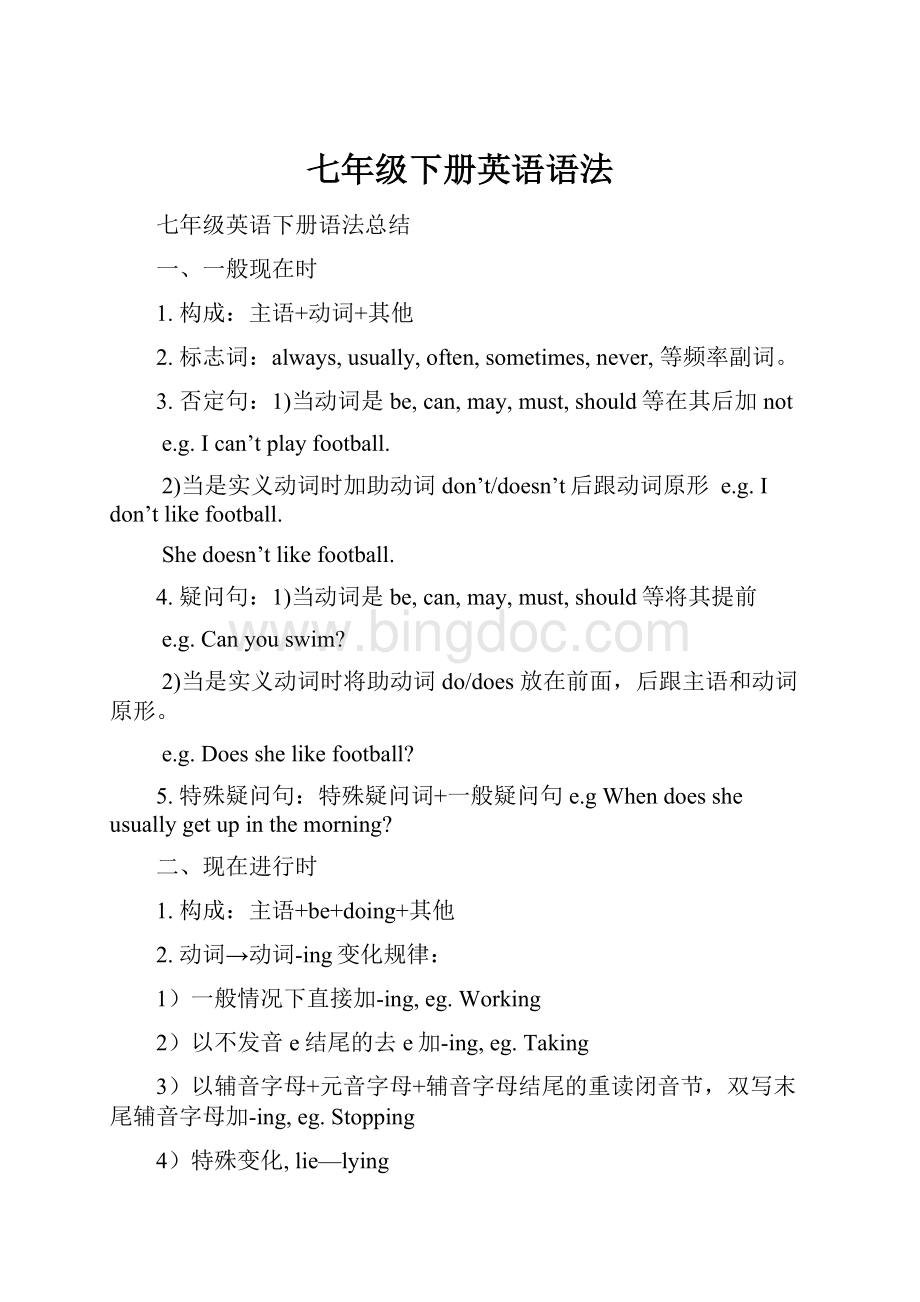七年级下册英语语法.docx
《七年级下册英语语法.docx》由会员分享,可在线阅读,更多相关《七年级下册英语语法.docx(42页珍藏版)》请在冰点文库上搜索。

七年级下册英语语法
七年级英语下册语法总结
一、一般现在时
1.构成:
主语+动词+其他
2.标志词:
always,usually,often,sometimes,never,等频率副词。
3.否定句:
1)当动词是be,can,may,must,should等在其后加not
e.g.Ican’tplayfootball.
2)当是实义动词时加助动词don’t/doesn’t后跟动词原形e.g.Idon’tlikefootball.
Shedoesn’tlikefootball.
4.疑问句:
1)当动词是be,can,may,must,should等将其提前
e.g.Canyouswim?
2)当是实义动词时将助动词do/does放在前面,后跟主语和动词原形。
e.g.Doesshelikefootball?
5.特殊疑问句:
特殊疑问词+一般疑问句e.gWhendoessheusuallygetupinthemorning?
二、现在进行时
1.构成:
主语+be+doing+其他
2.动词→动词-ing变化规律:
1)一般情况下直接加-ing,eg.Working
2)以不发音e结尾的去e加-ing,eg.Taking
3)以辅音字母+元音字母+辅音字母结尾的重读闭音节,双写末尾辅音字母加-ing,eg.Stopping
4)特殊变化,lie—lying
3.标志词:
look,listen,now,atthemoment,it’s…o’clock…
4.否定句:
be动词后加not
e.g.Sheisnotlisteningtomusic.
5.疑问句:
将be动词提前
e.g.Isshelisteningtomusic?
6.特殊疑问句:
特殊疑问词+一般疑问句e.gWhatisshedoingnow?
三、将来时
1.构成:
主语+begoingto+动词原形
主语+will+动词原形
2.标志词:
tomorrow,nextday/month/year等表示将来的时间
3.否定句:
be动词后加not;will后加not
e.g.Heisnotgoingtohaveapianolessonthisweekend.
Hewillnothaveapianolessonthisweekend.
4.疑问句:
将be动词提前;将will提前
e.g.Ishegoingtohaveapianolessonthisweekend?
Willhegoingtohaveapianolessonthisweekend?
5.特殊疑问句:
特殊疑问词+一般疑问句Whatareyougoingtodotomorrow?
\Whatwillyoudotomorrow?
四、过去时
1.构成:
主语+动词过去时+其他
2.标志词:
yesterday,justnow,…ago,thismorning,whenIwasyoung,last…等
3.动词→动词过去式变化规律:
1)一般动词结尾加-ed,e.g.Walk--walked
2)以字母e结尾的动词加-d,e.g.Live--lived
3)以辅音字母加y结尾的变y为i加-ed,e.g.Hurry—hurried
4)以辅音字母+元音字母+辅音字母结尾的重读闭音节,双写末尾辅音字母加-ed,eg.Stop–stopped
特殊变化详见课本P172
4.否定句:
1)动词be过去式后直接加not
e.g.IwasnotinChengdulastyear.
2)当是实义动词时,加助动词didn’t后跟动词原形
e.g.Ididn’ttelephonemyparentsyesterday.
5.疑问句:
1)动词be过去式提前
e.g.WereyouinChengdulastyear?
2)当是实义动词时将助动词did放在前面,后跟主语和动词原形
e.g.Didyoutelephonemyparentsyesterday?
6.特殊疑问句:
特殊疑问词+一般疑问句e.gWhatdidyoudoyesterday?
五、形容词、副词比较级,最高级
1.形容词
(1)在句子中做定语,一般放在名词之前。
但是当形容词修饰something,somebody,anything,anybody,nothing,
nobody时,要放于其后。
e.g.Ihaveaninterestingbook.
Thereisnothingserious.
(2)作表语,放在系动词之后。
e.g.Thiskindofdressisexpensive.
(3)以a-开头的形容词,一般在句子中只能作表语。
e.g.Keepquiet!
Mybabyisasleepintheroom.
(4)作宾语补足语,放在宾语之后。
e.g.Thegoodnewsmakesusveryhappy.
2.副词
副词在句子中主要做状语,可以修饰动词、形容词、副词。
修饰动词时,一般放在行为动词之后;修饰形容词时,一般放在形容词之前;表示时间、地点的副词一般放在句末或句首;频度副词一般放在行为动词之前。
e.g.Ican’thearyouclearly.
3.比较级用法
(1)可以单独使用eg.IhopetodobetterinEnglish.
(2)和than一起用eg.ZhangJunisstrongerthanLinTao.
(3)其他几种用法
a.两者比较,哪一个更怎么样?
Who/Which+be+比较级,AorB?
e.g.Whodidbetter,LucyorLily?
b.用比较级形式表达最高级意义
比较级+thananyother+n.+比较级范围(in/of…)
=比较级+thananyoftheothers+in/of…
=比较级+thantheother+n.+in/of…(在同一范围内比较)
比较级+thanany+n.+in/of…(在两个不同范围内比较)
e.g.Kateismorecarefulthananyothergirlinourclass
ShanghaiisbiggerthananycityinShangdongProvince.
c.越来越怎么样?
“比较级+and+比较级”
e.g.Ourcountryisbecomingstrongerandstronger.
d.有范围的两者之间的比较用“the+形容词比较级+ofthetwo”
eg.Mymotheristhebusierofthetwo.
e.用来修饰比较级的副词有:
much/far/lots/alot;alitter;even;still等
4.最高级用法用来对三个或三个以上的人或事物进行比较,形容词的最高级前必须加定冠词the,副词前的the可以省略。
a.最高级+范围
eg.ChangjianisthelongestriverinChina.
b.主语+be+oneofthe+形容词最高级+名词复数+比较级范围(of/in短语),表示“最……的……之一”。
eg.YangLiweiisoneofthemostfamousheroesinChina.
c.主语+be+the+序数词+形容词最高级+单数名词+比较范围,表示“……是……的第几”。
eg.TheYellowRiveristhesecondlongestriverinChina.
八年级上册语法复习
一、行为动词的一般过去时
1、过去式的构成规则
(1)一般情况下在动词原形后直接加-ed.如:
want—wanted
(2)以不发音的字母e结尾的动词,去掉e再加-ed.如:
hope—hoped
(3)重读闭音节单词需双写最后一个辅音字母再加-ed.如:
stop—stopped
(4)以辅音字母+y结尾的动词改y为i,再加-ed.如:
study—studied
注意:
不规则动词变化,要逐一熟记。
2、实义动词过去式的句式。
①肯定式:
主语+动词过去式+其它。
如:
Theyhadagoodtimeyesterday.
②否定式:
主语+didnot(didn’t)+动词原形+其它。
如:
Theydidn’twatchTVlastnight.
③一般疑问句:
Did+主语+动词原形+其它?
肯定回答:
Yes,主语+did.否定回答:
No,主语+didn’t.
如:
Didtheyhaveameetingtwodaysago?
Yes,theydid./No,theydidn’t.
④特殊疑问句:
特殊疑问词+did+主语+动词原形+其它?
如:
Whattimedidyoufinishyourhomework?
3.一般过去时的用法:
a.主要用于过去某个时间发生的动作或状态。
MyfatherworkedinShanghailastyear.
b.表示过去经常或反复发生的动作,常与often,always等表示频度的时间状语连用。
Ioftenwenttoschoolonfoot.
c.与when等连词引导的状语从句连用。
Whenhegothome,hehadashortrest.
4.一般过去时的时间状语:
amomentago(刚才),yesterdaymorning,lastnight/week,thedaybeforeyesterday(前天),justnow(刚才),in2006,threedaysago等
对应练习:
用所给动词的正确形式填空
1.I__________(go)toschoolyesterday.
2.She_________(play)footballlastweek.
3.Look!
Jack_________(sing)now.
4.You_____(read)thenewpaperthedaybeforeyesterday.
5.I_________(see)Jackinthezoolastweekend.
6.I__________(do)myhomeworklastnight
7.She_________(open)themailboxthedayaftertomorrow.
8.I_______(help)thelittlebabydrinkthemilkthenextmorning.
9.Thefarmers__________(work)onthefarmnextweek.
10.Myparents_________(watch)TVlastMonday.
句型转换
1. IwenttothepartylastFriday.(改为一般疑问句)
______you______tothepartylastFriday?
2. IhadanicetimelastSunday.(改为一般疑问句)
______you_______nicetimelastSunday?
3. WewenttoLondontwoyearsago.(对划线部分提问)
____________you_______toLondon?
4. Hedidhishomeworkinthemorning.(改为否定句)
He___________hishomeworkinthemorning.
二、现在完成时
谓语构成:
助动词have/has+动词的过去分词
用法:
(1)表示过去发生的动作对现在造成的影响或结果,常与already(已经),ever(曾经),yet,just(刚刚),before(以前)等词连用。
(2)表示过去发生的动作持续到了现在,常与for或since引导的时间状语连用。
标志词:
(1)just,never,ever,already,yet等
(2)for+一段时间;since+点时间或引导时间状语从句(一般多为过去时
(3)sofar(到目前为止);inthepast/last+表示一段时间的词语
各种句式结构:
肯定式:
主语+have/has+过去分词+其他
e.gIhavelivedherefortenyears.
Lucyhaslivedheresince2001.
否定式:
主语+haven’t/hasn’t+过去分词+其他
e.gTheyhaven’thadbreakfastyet.
一般疑问句:
Have/Has+主语+过去分词+其他?
e.gHaveyoueverbeentoBeijing?
特殊疑问句:
疑问词+have/has+主语+过去分词+其他?
e.gHowlonghashelivedhere?
练习:
写出下列动词的过去分词形式:
1、see—2、hear—
3、study—4、stop—
5、write—6、teach—
7、catch—8、go—
9、play—10、live—
11、make—12、forget—
(一)考查现在完成时的一般用法
()1.——Kitty,willyougotoseethefilmColdMountainthisevening?
——No,Iwon’t.I_______italready.
A.sawB.haveseenC.seeD.willsee
()2.GonewiththeWindisawell—knownnovel.She_______ittwice.
A.readB.isreadingC.readsD.hasread
()3.——Howlong_____you_____here?
——Forabouttwoyearssofar.
A.have;studiedB.did;live
C.do;stayD.havechanged
(二)考查非延续性动词与一段时间连用的表达方式
()1.——Oh.Mrs.king,yourdresslooksnice.Isitnew?
——No,I_____itsincetwoyearsago.
A.hadB.havehadC.boughtD.havebought
()2.Jeffborrowedahistorybookfromhisfriend.
He____itforaweek.
A.hasborrowedB.haslentC.haskeptD.lend
()3.Thestudentsaresorrytohearthatthefamoussinger_____forhalfanhour.
A.hasleftB.hasgoneC.hasbeenaway
D.hasgoneaway
(三)考查have/hasbeento,have/hasgoneto与have/hasbeenin的区别
()1.——Where'syourfather?
——He____Shanghai.He’llbebacknextweek.
A.hasgonetoB.hasbeentoC.havegonetoD.havebeento
()2.——WhereisDavid?
——He_____toEnglandonbusiness.
A.isgoingB.hasgoneC.hasbeenD.goes
()3.——_____youever_____totheUnitedStates?
—----Yes,twice.
A.Have;goneB.Have;beenC.Do;goD.Were;going
(四)考查for与since接时间状语时的区别
()1.——Whatanicedog!
Howlonghaveyouhadit?
----_____twoyears.A.ForB.SinceC.In
()2.MissGaohastaughtinthisschool____1993.
A.forB.atC.inD.since
(五)考查现在完成时与一般过去时的区别
()1.---HehasalreadygonetoEngland.
---When______he_______there?
A.will;goB.is;goingC.did;goD.has;gone
()2.—Haveyoureadthisbook?
—yes,I____ittwoweeksago..
A.amreadingB.havereadC.willreadD.read
(六)现在完成时在特定语境下的使用
()1.——Helen,Itoldyoutodoyourhome-workascarefullyasyoucan?
——Yes,butI——fewermistakesthanIusuallydo.
A.wasmakingB.havemadeC.willmakeD.hadmade
()2.——Hasthematchstarted?
——Started?
Finished!
GuoYue______.
A.iswinningB.winsC.willwinD.haswon
()3.XiaoWang_____Englishforthirteenyears.SohecanspeakquitegoodEnglish.
A.hadlearnedB.haslearned
C.willbelearningD.learns
()4.Thefilm_______forhalfanhour.
A.hasbegunB.hasbeenbegun
C.hasbeenonD.began
()5.Youdon’thavetodescribeher.I______herseveraltimes.
A.hadmetB.havemetC.meetD.met
()6.MissYangisnotathome.She____totheschoollibrary.
A.wentB.hasbeenC.goesD.hasgone
()7.HehasnevervisitedtheGreatHallofthePeople._____?
A.hasn’theB.hasheC.doesheD.doesn’the
三、过去进行时
谓语构成:
was/were+现在分词V-ing
用法:
表示在过去的某一时间正在进行的动作或存在的状态
时间状语:
atthistimeyesterday(昨天这个时候)
atthattimelastweek(上周那个时候)
atnineyesterdayevening(昨晚九点时)
fromseventotenlastnight(昨晚从七点到十点)等,
when或while引导时间状语从句的主、从复合句。
e.gIwasreadinganewspaperwhenhecamein.
他进来时,我正在看报。
WhileIwaswalkinghome,ImetMrGreen.
我步行回家时遇到了格林先生.
Myfatherwasreadinganewspaperwhilemymotherwascooking.
妈妈做饭时爸爸在看报。
注:
while引导时间状语从句的主、从复合句,两个过去进行时并用,表示动作同时发生。
各种句式结构:
肯定式:
主语+was/were+v-ing+其它
e.gHewassleepingwhenshearrived.她到达时他正在睡觉。
否定式:
主语+was/werenot+v-ing+其它
e.gTheyweren’tplantingtreesatnineyesterday.昨天早上九点他们不在植树。
一般疑问句:
Was/Were+主语+v-ing+其它?
e.gWasheplayingfootballwhenyourangme?
你打电话给我时.他正在踢足球吗?
特殊疑问句:
疑问词+was/were+主语+v-ing+其它?
e.gWhatwasPeterdoingatthistimelastweek?
上周这个时候彼特在于什么?
练习:
用was/were填空:
1、I___listeningtothemusic.
2、She___playingthepiano.
3、They__lookingattheflowers.
4、We___havingapicnic.
5、Lingling___watchingTV.
6、Twoboys___readingbook.
7、Youruncleandaunt__visitingtheGreatWall.
8、Everyone___havinglunch.
9、People__workingonthefarm.
10、Somewomen__singingpopmusic.
用所给动词的适当形式填空。
1.You____________(have)ameetingat9lastMondaymorning.
2.T